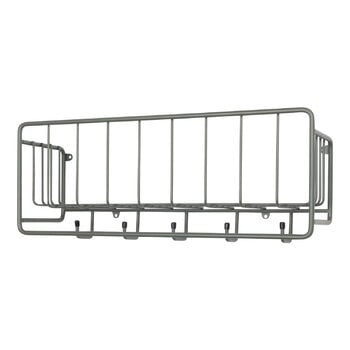The Midtown shelf by the Swedish Maze is a geometric wall-mounted rack with a functionalism-inspired form. Besides small important items, Midtown helps you store clothes, bags and accessories, as well, with the help of the five metal hooks underneath the shelf. The Midtown shelf, designed by the acclaimed Spanish designer Álvaro Diaz Hernandez, is made in Sweden using partially recycled metal.
Midtown shelf, green grey
Maze
Description
The Midtown shelf by the Swedish Maze is a geometric wall-mounted rack with a functionalism-inspired form. Besides small important items, Midtown helps you store clothes, bags and accessories, as well, with the help of the five metal hooks underneath the shelf. The Midtown shelf, designed by the acclaimed Spanish designer Álvaro Diaz Hernandez, is made in Sweden using partially recycled metal.
Product details (6)
- Material
- Powder-coated metal
- Colour
- Green grey
- Width
- 50 cm
- Depth
- 15 cm
- Height
- 20 cm
- Notes
- Screws not included.
- Product ID
Designer
Álvaro Díaz Hernández is a Spanish interior designer whose repertoire also includes smaller-scale design work like furniture design – in addition to complete interiors and spaces, he is particularly interested in easily approachable everyday design. Díaz Hernández, who graduated as an interior designer in 2014 and later also studied furniture design, presented his first furniture collection at the 2016 Milan Furniture Fair. He has been awarded as the best new talent at the DMY design event 2016 in Berlin and the Design Star award at the 2018 Singapore Furniture Fair. Díaz Hernández lives and works in Madrid.
View all productsReviews (0)
Sustainability
The Product Sustainability Framework, our criteria of sustainable design, helps you find the most sustainable products in our selection. Read below which sustainability criteria this product has met.
Working conditions & labour 6/9
-
Equal opportunities for all employees
-
Commitment to UN Global Compact, fair compensation for all employees
-
Corporate responsibility requirements defined and communicated for suppliers
-
Systematic work for improved inclusion and well-being in the workplace
-
Transparent supply chain
-
Suppliers' compliance to a code of conduct ensured
-
Direct suppliers audited and certified
-
Compliance to the UN Guiding Principles on Business and Human Rights ensured in the supply chain
-
Support for community involvement in the supply chain
Eco-friendly production 7/9
-
Fair and resource-wise water-use in production
-
No incineration or landfilling of returned items
-
No use of endangered species as materials
-
No direct environmental emissions or waste (excl. GHGs) from production
-
The sustainability of direct suppliers' production is addressed and monitored
-
Material-efficient and ecological packaging
-
No potentially harmful chemicals used in own production
-
Production and material sourcing that respect biodiversity, animal rights, and natural ecosystems
-
Positive impact on nature’s well-being through operations that regenerate natural ecosystems
Climate impact 3/8
-
Company's direct greenhouse gas emissions identified and commitment to reduction
-
Product's carbon impact identified and commitment to reduction
-
Guidance on energy- and eco-efficient use of the product
-
Contribution to climate initiatives beyond the brand’s direct operations
-
Low-carbon or compensated transportation
-
Carbon footprint of the product calculated and goals set to reduce it
-
100 % renewable energy in own production and operations
-
Carbon neutral or carbon negative product
Sustainable materials 6/6
-
Sustainable and long-lasting material choices
-
No harmful or hazardous substances
-
Responsible raw material sourcing and production
-
Materials suited for circularity: monomaterials, recyclable finishings, renewable or recycled contents etc.
-
Ecological materials: natural, biodegradable, recyclable or recycled contents
-
Outstanding materials in terms of innovativeness, responsibility, sustainability and circularity: local production or sourcing, 100 % recycled content, C2C-certification etc.
Circular design 4/5
-
High aesthetic quality promoting long-term use of the product
-
Technically durable product design and material choices
-
Design for enduring life-long quality
-
Design and support for product maintenance, repair and upgradability
-
Innovative circular design solutions: circular service system, resale platform, remanufacturing, collection of used products, etc.






